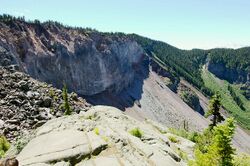Earth:The Barrier
| The Barrier | |
|---|---|
 The rock fall area and the edge of The Barrier | |
| Official name | The Barrier |
| Location | British Columbia, Canada |
| Coordinates | [ ⚑ ] : 49°56′06″N 123°04′48″W / 49.9349°N 123.0800°W |
| Dam and spillways | |
| Type of dam | Lava dam |
| Impounds | Rubble Creek |
| Height | 243 m (800 ft) |
| Length | 2.4 km (1.5 mi) |
| Spillways | 1 |
| Spillway type | Uncontrolled |
| Reservoir | |
| Creates | Garibaldi Lake |
| Surface area | 9.94 km2 (3.84 sq mi) |
| Maximum water depth | 258.7 m (849 ft) |
| Normal elevation | 1,484 m (4,869 ft) |
The Barrier is a lava dam retaining the Garibaldi Lake system in southwestern British Columbia, Canada . It is over 300 m (980 ft) thick and about 2.4 km (1.5 mi) long where it impounds the lake.[1]
The area below and adjacent to The Barrier is considered hazardous due to the unstable lava formation.
Formation
The Barrier was formed about 15,000–12,000 years ago when large lava flows emanated from Clinker Peak on the west shoulder of Mount Price. The large lava flowed towards the Cheakamus River valley. At the time of eruption, the valley was filled by glacial ice. The lava flow was stopped by the ice and ponded, eventually cooling to form an ice-marginal lava flow. When the ice melted away, the ice-cooled lava-flow front formed a precipitous cliff; water ponded behind the lava dam, forming Garibaldi Lake.
Rubble Creek boulder field
The unstable lava formation of The Barrier has in the past unleashed several debris flows in the area below Garibaldi Lake. The most recent major landslide in 1855-1856 formed a large boulder field which gives Rubble Creek its name.[2] At least 30,000,000 m3 (1.1×109 cu ft) of rock was removed from The Barrier during the 1855-1856 event.[3]
Hazards
Concerns about The Barrier's instability due to volcanic, tectonic, or heavy rainfall activity prompted the provincial government to declare the area immediately below it unsafe for human habitation in 1981.[4] This led to the evacuation of the small resort village of Garibaldi nearby, and the relocation of residents to new recreational subdivisions away from the hazard zone.[5] Should The Barrier completely collapse, Garibaldi Lake would be entirely released and downstream damage in the Cheakamus and Squamish Rivers would be considerable, including major damage to the town of Squamish[6] and possibly an impact-wave on the waters of Howe Sound that would reach Vancouver Island.
See also
- Garibaldi Lake volcanic field
- Garibaldi Volcanic Belt
- Cascade Volcanoes
- Volcanism in Canada
- Garibaldi Provincial Park
References
- ↑ BCGNIS Geographical Name Details
- ↑ Catalogue of Canadian volcanoes - Garibaldi volcanic belt Retrieved on 2007-09-07
- ↑ "Where do landslides occur?". Government of British Columbia. http://www.empr.gov.bc.ca/Mining/Geoscience/SurficialGeology/Landslides/Pages/Wheredolandslidesoccur.aspx. Retrieved 2010-03-03.
- ↑ "Fire and Ice: Distinctive landscape features of Garibaldi Provincial Park". http://cgip.wetpaint.com/page/Fire+and+Ice%3A+Distinctive+landscape+features+of+Garibaldi+Provincial+Park.
- ↑ Ferreras, Jesse. "The Barrier remains a concern". Pique. http://www.piquenewsmagazine.com/whistler/the-barrier-remains-a-concern/Content?oid=2168867.
- ↑ Powell, Michael. "Garibaldi Lake a ticking time bomb". Squamish Chief. http://www.squamishchief.com/news/garibaldi-lake-a-ticking-time-bomb-1.1753732.
 |

